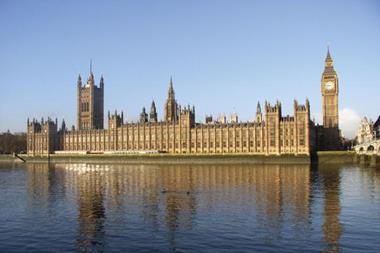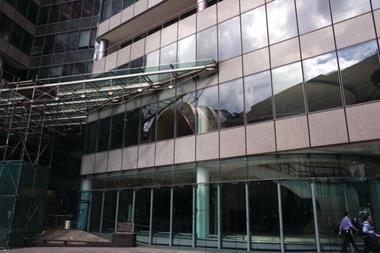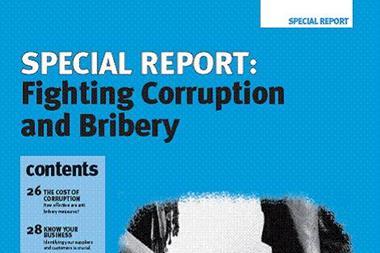Forum allows members to share best practice on fraud, bribery and corruption prevention
PRICEWATERHOUSECOOPERS has launched the PwC Fraud Academy, a forum allowing members to share information on how best to prevent, detect and investigate fraud, bribery and other economic crime.
John Tracey, a partner in PricewaterhouseCoopers LLP forensic accounting practice said: ‘We wanted to provide a forum for clients and others to share knowledge at a time of unprecedented change in how fraud and economic crime is perpetrated and combated.
‘The ebbing economic tide is exposing frauds that lay submerged and were sustainable when times were good.
Alongside this, the downturn is affecting companies of all sizes in all sectors. Banking covenants are being breached, costs are being cut, reputations and businesses are on the line. The pressure for some to “cross the line”, or to turn a blind eye while others do so, is growing. Companies urgently need to look to at the measures they have in place to resist this trend.’
The world of regulation and enforcement in this area is also changing. The incoming Bribery Bill seeks to replace the UK’s patchwork of Victorian legislation with a purpose built system appropriate for dealing with companies operating in a global market place. Under these new rules companies and directors will be firmly in the firing line for abuses in their sales channels and supply chains, whether they have been conscious of these or not.
Regulators are also showing a renewed desire to be proactive and to work together with business to understand how best to enforce the rules. Richard Alderman, head of the Serious Fraud Office, said: ‘There is so much more that the SFO wants to do to help society protect itself from serious fraud.
This means engagement, talking to companies, to professional advisers, to regulators and to international partners. Above all it means sharing ideas and where we can, sharing learning. The Fraud Academy will play an important role in all of this.’
The twin forces of globalisation and technology have also had a permanent impact on the nature of business fraud and economic crime. Andrew Gordon, a partner in PricewaterhouseCoopers LLP forensic accounting practice said:
‘The rapid increase in the prevalence and mobility of digital technology in business has changed the game. Over the last two decades certain types of fraud have evolved from Tippex and fax machines to deeply digital affairs. It is strange to imagine, but at the time of the UK’s last downturn in 2001, the internet was not even a commonly used business tool. Now it is used by almost every business and most private individual have access. ‘This is just one example of how the landscape has changed and how the speed of change can render companies’ preventative systems and procedures obsolete.
Companies are faced with a continually shifting terrain in this area and joining the Fraud Academy will help them to respond to the threat of fraud in the most appropriate and effective way.’ Most of those attending the launch were heads of risk management, security and internal audit.
...and more on corruption
AS BUSINESS becomes increasingly globalised, more and more companies find themselves operating in jurisdictions plagued by pervasive corruption and weak corporate governance standards. In this climate, companies operating internationally are forced to devote increased time and resources to due diligence.
As a response to this increasing market demand, Control Risks has established a new investigations team dedicated to high-volume, compliancefocused due diligence screening services. Its global business integrity programmes (GBIP) division is designed to assist clients in structuring and executing due diligence programmes under which the client’s potential counterparties – such as local sales agents, joint venture partners, intermediaries, clients and candidates for senior positions – are screened for evidence of corrupt activities, money laundering, unethical conduct or other issues of concern.
US and European enforcement agencies have recently handed down historic fines (running into millions and sometimes billions of dollars) under legislation such as the US Foreign Corrupt Practices Act, and the US Department of Justice has shown a sharply increased emphasis on individual liability. This and the prospect of the introduction of a new Corruption Bill in the UK will make it even more critical for companies and executives conducting business overseas – particularly in emerging markets – to implement and adhere to global compliance programmes that meet the requirements set out by international and local regulators. The key role of third party due diligence has been underlined by the US Department of Justice, which has stated that regulators would consider the extent - or absence of - due diligence when resolving a case pertaining to foreign payments.
Mark Mendelson, the DOJ’s chief prosecutor of foreign bribery, has advised companies to undertake ‘aggressive due diligence’ and said that the DOJ would be ‘much less sympathetic’ to companies that ‘stumble on’ foreign payments a year or two after the transaction. For these and other reasons, GBIP offers compliance solutions in the form of robust due diligence, tailored to the specific needs of individual clients. Toby Latta, regional director for Control Risks comments: ‘In this climate of rigorous enforcement, it has become critically important for companies conducting business internationally to implement programmes to appropriately vet all of their business partners. It is vital that such companies understand the professional history of individuals and companies and whether there is evidence of illegal or unethical activity.’



















